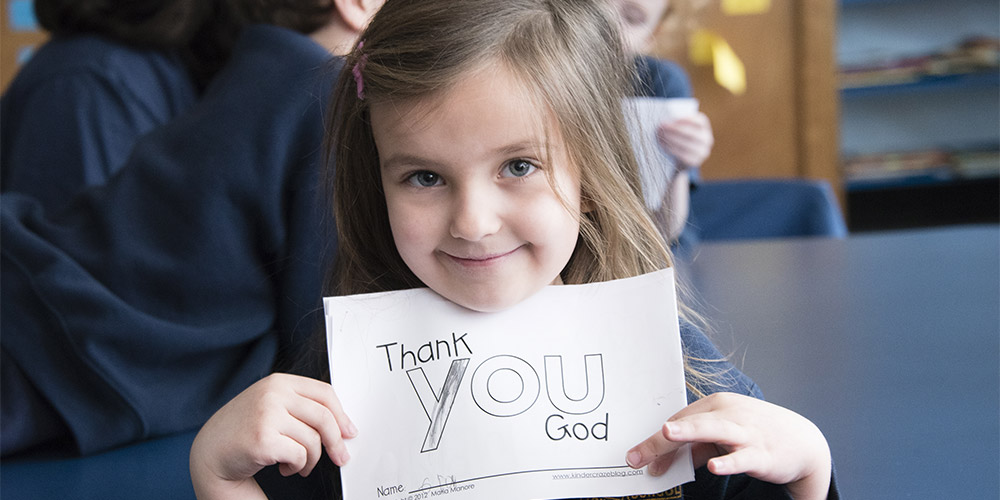Rooted deeply in Gospel values and virtues, our religious education program nurtures the mind, heart, and spirit of each child, providing a solid foundation in the Catholic faith that grows with them year by year. At every stage, instruction is attuned to students’ developmental readiness and seeks to inspire a lasting, personal encounter with Jesus Christ.
Early Childhood (Pre-K and Kindergarten):
Young learners are lovingly introduced to Jesus as the Good Shepherd, our caring guide and protector who walks beside us every day. Through approachable Bible stories and simple prayers of praise and gratitude, children begin to recognize God’s loving presence in their lives and become familiar with the life and teachings of Jesus.
First Grade:
Students come to understand God as the Creator of all things, heaven and earth alike, infinitely loving, holy, and wise. They learn that every person is fashioned in God’s image, imbuing each life with sacred dignity. This year emphasizes gratitude, respect for life, and stewardship of God’s creation, encouraging children to care thoughtfully for themselves, others, and the world around them.
Second Grade:
Preparation deepens as children ready themselves to receive the sacraments of Reconciliation and First Eucharist. Exploration of Jesus’ life is paired with teaching about God’s mercy and forgiveness, centered on the liturgical calendar’s rhythms. Collaboration with families strengthens children’s understanding of grace and draws them toward active participation in sacramental life, building an enduring relationship with Christ.
Third Grade:
Building on sacramental initiation, students explore the Church as a living faith community. Focus on the seven sacraments reveals how God reaches out to nurture and unite his people. Children deepen their awareness of belonging in the Body of Christ and learn to respond faithfully in community.
Fourth Grade:
Morality takes center stage as students study the ethical teachings Jesus entrusted to his followers. They engage with the Ten Commandments, the Beatitudes, and the Corporal and Spiritual Works of Mercy, and learning to live joyfully in the right relationship with God and neighbor. This year fosters conscience formation and commitment to Catholic Social Teachings.
Fifth Grade:
As personal reflection deepens, students revisit the sacraments through the lens of an intimate, respectful relationship with God. Emphasis is placed on growing friendship with Jesus as a source of strength and guidance amidst life’s challenges.
Sixth Grade:
Students delve into salvation history, encountering God’s revelation through Scripture. They journey from the promises of the Old Testament to their fulfillment in Jesus Christ, gaining insight into God’s plan and the yearning of the human heart for divine love.
Seventh Grade:
Adolescents are invited to examine the Gospels closely, discovering how God’s presence is communicated through the sacraments. This year importantly addresses human sexuality as a sacred gift, fostering respect for self and others. Students prepare thoughtfully for Confirmation, embracing their evolving role in the Church.
Eighth Grade:
Focus shifts to the impact of personal choices on relationships and community life. Students study Church history to glean lessons in leadership, service, and social responsibility. Prayer practices expand, supporting students as they encounter God both corporately and individually, and as they cultivate a mature spiritual life. Confirmation preparation culminates in receiving the sacrament, sealing their commitment as Catholic disciples.
Faith in Action, Throughout All Grades:
Active service and social responsibility are vital threads woven throughout the curriculum. Students engage regularly in community outreach and faith-based projects, embodying Gospel values in tangible ways. Communal worship, including Mass and prayer, grounds the faith experience, reinforcing classroom lessons and cultivating a vibrant school-wide Catholic identity.
Assessment and Growth:
From third through eighth grade, students participate in the Archdiocesan religion assessment to reflect on their knowledge, understanding, and lived witness to the faith. This informs ongoing formation and nurtures responsibility for continual spiritual growth.
This vision integrates developmental progression, sacramental formation, and the living traditions of the Church to equip students to follow Christ faithfully while embracing their role as compassionate, informed members of the Catholic community and the world.




